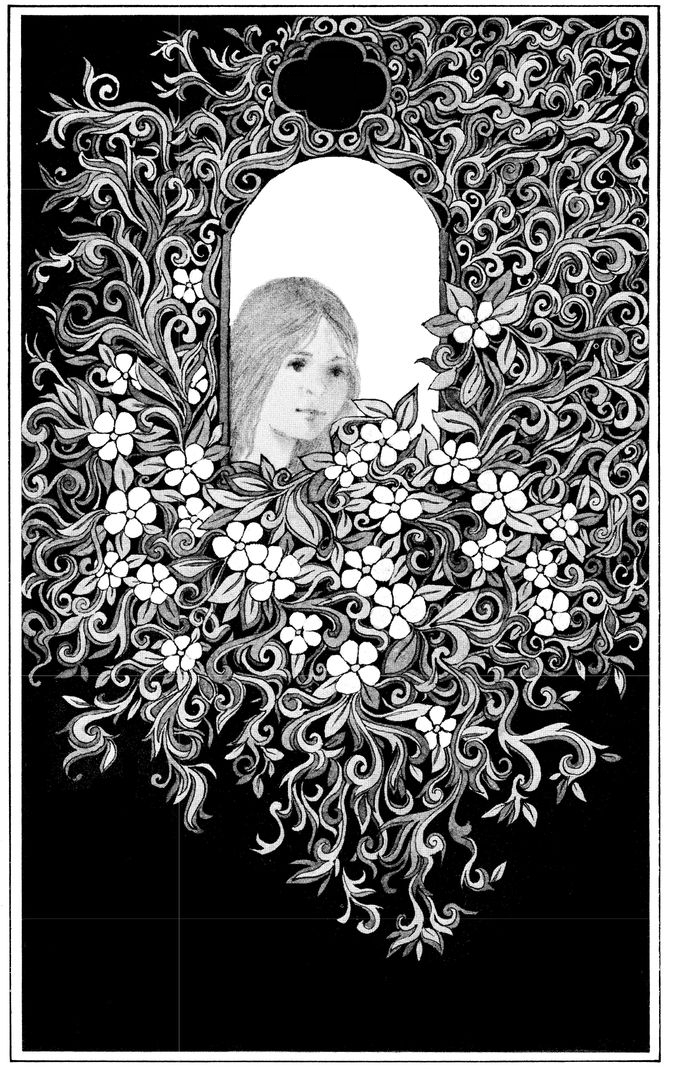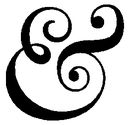Figgs & Phantoms (16 page)
Authors: Ellen Raskin

“I don't know how to be twenty-three years old,” Mona complained. “And I'll never remember such a long name.”
“You don't have to remember it, unless you plan to spend the entire evening talking to yourself. Now make yourself taller.”
“Why do I have to be taller? Phoebe's shorter than I am, and....”
“Taller, seven inches taller, you obstinate child,” the pirate insisted. “Why should I invent a short companion when I'm over six feet tall?”
Mona grew, looking up, looking into the rugged face of the dream-maker. “Did you look the same in real life?” she asked in admiration.
“I look exactly as I did at the age of thirty,” he replied.
“How old were you when you died?”
“Old. I lived a long life, learned and loved many things. And so should you.”
“You mean I can come back?” The pirate didn't answer. “I'll learn everything there is to learn; I'll look at everything there is to see. I'm a good memorizer, just like my Uncle Romulus, the Walking Book of Knowledge.”
The pirate did not seem overjoyed at the prospect of seeing Mona again. “Pile your stringy hair on top of your head and wear a long white dress,” he ordered.
Mona felt like the Statue of Liberty in one of Sissie's tableaus.
The pirate frowned. “Can't you put some flounces on the sleeves and hem? You are the dumpiest guest I ever had. Never mind, your compassionate uncle invites even stranger-looking guests, poor souls who found no happiness in life.”
Mona thought of the pig-faced woman as her host studied her with a critical eye. “Try, at least, to look a bit older.”
“Maybe if I put a few worry lines in my face....”
“You have too many worry lines now. Try to look serene, confident. Try to look like a real person.”
“I am a real person,” Mona insisted.
“You are a selfish, stubborn, self-centered child,” the would-be pirate replied.

A gong reverberated through the marble corridors. The guests had arrived, singing.
“âHurrah for our Pirate King!
And it is, it is a glorious thing
To be a Pirate King!
It is!
âHurrah for our Pirate King.”
And it is, it is a glorious thing
To be a Pirate King!
It is!
âHurrah for our Pirate King.”
The pirate king strode with open arms to greet his guests. His clothes faded and he emerged from the shadowy envelope dressed in a gleaming black suit with white ruff, ruffled cuffs, and silver-buckled knee breeches.
“Dear Phoebe. Florence, my friend. Thank you for coming. May I introduce Señorita Narcissus Maria-Teresa Murillo y Olivares de Santiago.”
The tall señorita presented a hand to her bowing uncle. She had planned to whisper her identity in his ear, but Florence was still only four-feet six-inches tall. And her captor was watching her with an alert eye. “You must be Florence Figg. I've heard so much about you. Delighted, I'm sure.”
Florence kissed her hand politely and introduced his wife. Mona nodded in haughty recognition, then strode past Phoebe, head held high.
“Please join us on the terrace for some refreshments,” Mona said with a broad gesture as she swept up the steps. The full-flounced skirt and added seven inches proved too much for Mona's fine balance. She stumbled into Phoebe's open arms.
“I'm so sorry, señorita,” Mrs. Figg said sweetly. “We must have adjusted the rise of the step too quickly. It is indeed a pleasure to have such a beautiful guest visit our island.”
Mona thanked Phoebe with a warm smile and studied her carefully as the pirate uncorked a bottle of champagne. Phoebe looked like Uncle Florence, acted like Uncle Florence, but was softer, tenderer. The motherly Phoebe was the female counterpart of her uncle, the part he had never allowed himself to be. Phoebe could stay, Mona decided; Phoebe and Florence would be her parents forever. And the pirate could be.... But she had little time left if she was to remain in Caprichos. Florence was still ignorant of her true identity.
Florence raised his glass in a toast. Mona stared hard at the glass in his hand and changed the liquid to celery tonic, her uncle's favorite soda. Mona watched for his reaction over the rim of her glass as she took her first sip of champagne.
“Ilck!” Mona uttered involuntarily, surprised by the sour taste. The pirate scowled, then forced a laugh. “Perhaps I should have served sangria to my Spanish guest.”
“Or do what I do, señorita,” Florence suggested. “I pretend the liquid is celery tonic. I prefer it to champagne, I'm ashamed to say. Would you like me to change yours? ”
“No, thank you, I'm just fine,” Mona mumbled. Her plan was faltering. Her host was angry with her.
The discussion turned to paintings for the main hall of the palace. Phoebe suggested a Gauguin. She had seen reproductions of his work in one of Florence's books and found the people beautiful, and the exotic setting would mirror the palace landscape.
Uncle Florence suggested Veláquez' “Las Meninas,” one of the most glorious paintings ever created by man. “And Spanish,” he added with a shy smile.
Mona gathered all of her courage. She knew the name of one painting, and now was the time to say it. “The greatest painting of all time is one with which I am quite familiar,” she announced. “It is by Leonardo da Vinci, and it is called âThe Mona Lisa.'”
Mona Lisa Newton awaited her uncle's cry of recognition. Instead he and Phoebe regarded their host anxiously.
The would-be pirate calmly explained. “The señorita doesn't know. You see,” he said to Mona gravely, “I had come on that very painting on a royal treasure ship. In honor of the victory I made a gift of âThe Mona Lisa' to my dear friends the Figgs.”
“Mona Lisa was the name of Florence's favorite niece,” Phoebe said. “And it is also the name of our two-year-old daughter.” The couple smiled at each other with parental pride.
“Our little one looks just like my bride,” Florence added, beaming. “I hope you'll have a chance to visit our cottage and meet her, señorita.”
“No,” Mona replied in a whisper. Strains of a waltz drifted through the open French doors. “No, I'm afraid I shall be leaving soon.”

The pirate ushered the Figgs into the sapphire ballroom. Mona hobbled after them and stood at the door, watching Uncle Florence and Phoebe waltzing in perfectly paired little steps, gazing lovingly into each other's eyes. Mona wanted to remember her Uncle Florence as he looked now: carefree and contented, no longer the shy, wounded creature out of place in a world too large. Uncle Florence was deservedly happy.
Blinded by tears, Mona turned to leave.
“May I have this last dance?” Capitán Miguel de Caprichos, his leopard eyes flashing, placed a strong arm around Mona's waist. He held her hand. His hand was warm, so warm. Mona spun around the floor in El Pirata Supuesto's embrace, whirling and twirling, faster, faster through a swirling nothingness.

Tap-tap-tappity-tap-tap.

VI


1. WELCOME HOME
T
AP-TAP-TAPPITY-TAP-TAP. The noise was deafening.
AP-TAP-TAPPITY-TAP-TAP. The noise was deafening.
His hand was warm, so very warm.
Mona opened her eyes to a face in the whiteness. “Daddy,” she mumbled, and tried to sit up through the tangle of tubes. Newt let go of her hand and eased her back into the pillow.
“Just lie back, princess. You're in the hospital. Sissie, come here quick,” Newt shouted to his dancing and crying wife. “Mona's awake.”
“My baby!” Sissie shrieked, tears streaming down her cheeks. She kissed her daughter's eyes and nose and ears and mouth, then ran out of the room to get the doctor.
Newt stroked Mona's damp hair back from her forehead. “You've been sick, princess, very sick. Everybody's been so worried. Your mother's been dancing her feet off hoping you'd hear the tapping, wherever you were, and come back to us.”
“Welcome back, young lady,” Dr. Davenport said, checking her vital signs and unplugging her from the machines. “I don't think you'll be needing these anymore, but I want you to lie still and rest. You set a medical record, you did. We were ready to give up on you days ago, but your father wouldn't let us. Over his dead body, he said. You must be the stubbornest critter on the face of this earth.”
Other books
The Brothers K by David James Duncan
The Natural Superiority of Women by Ashley Montagu
Perfect Peace by Daniel Black
Jump! by Jilly Cooper
Mountain Menage Part 1: Prologue by Kinley Grey
The Principles Of Lust by Sasha White
Only a Shadow by Steve Bein
Breathless Awakening (The Breathless Series) by Aybara, K
Oslo Overtures by Marion Ueckermann
A Wicked Pursuit by Isabella Bradford